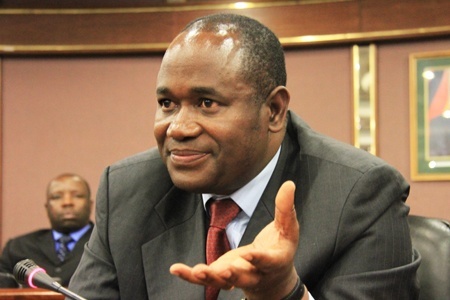
Until the cash crisis began to bite, Reserve Bank of Zimbabwe (RBZ) governor John Mangudya’s tenure had been associated with building bridges as he smoked the peace pipe with his constituency that had been brutally battered by his predecessor Gideon Gono.
BY OUR STAFF
When he was appointed to the helm of the RBZ in May 2014, Mangudya reached out to all stakeholders as he sought to come up with a winning formula to steer the economy out of the doldrums.
Enter the cash crisis!
On May 4 this year Mangudya announced that RBZ would introduce bond notes that would come in the form of a 5% export incentive to boost local production and all hell broke loose.
Stakeholders were not consulted before the announcement and consultations have only started now, more than a month later.
Analysts said he had adopted a knee-jerk reaction to cash shortages, especially after revising the measure that would have seen exporters getting 40% of their proceeds in South African rand.
As part of his broader consultation exercise, Mangudya has met church leaders as he seeks divine guidance to extricate the economy from the crisis. In his last days at RBZ, Gono met church leaders; Ufic’s Emmanuel Makandiwa and Spirit Embassy’s founder Uebert Angel after the latter had gained fame for his “miracle money”.
- Chamisa under fire over US$120K donation
- Mavhunga puts DeMbare into Chibuku quarterfinals
- Pension funds bet on Cabora Bassa oilfields
- Councils defy govt fire tender directive
Keep Reading
The two governors’ knee-jerk reaction to crises has drawn parallels with critics arguing they were cut from the same cloth.
An economist told Standardbusiness that the tenures of Gono and Mangudya had an underlying principle they had to deal with—fighting fiscal indiscipline.
“In 2008 lack of fiscal discipline pushed hyperinflation and currently it has worsened the liquidity crisis. An example is the move by government to pay bonuses when it did not have the money. The principles of Gono and Mangudya are similar, even if the context is different,” he said.
The economist said it was clear Zimbabweans had lost trust in the central bank as evidenced by the resistance to the introduction of bond notes, which are seen as reviving the moribund Zimbabwean dollar.
“The way to restore trust is through a consultative process and what happened should have been avoided,” he said.
“Even if RBZ doesn’t bring back the Zimbabwean dollar, the economy has already suffered.
“In this context, characterised by a legacy of lack of trust, public policy needs to bridge that gap and it requires a lot of consultations that must be done properly.”
Economist John Robertson said while the 2008 and 2016 eras were different, both governors were acting on directives from government.
“I don’t think there is much comparison between the two, but they are given directives by the president and that’s why the senior people don’t see the need to consult because they are carrying out directives,” Robertson said.
Economist Tony Hawkins said while Mangudya was not trying to bring back the Zimbabwean dollar, he should have consulted before implementing the bond notes policy. “I don’t think Mangudya is trying to bring back the Zimbabwe dollar but I also don’t think he knows what he is doing because he contradicted his statement [on bond notes] twice,” he said.
“So he is pretty much at a loss as to what to do and now he is trying to make corrections.”
“I think that was being shortsighted on his part and he tried to backtrack and review his statement that the bond notes were not to address cash shortages but an export incentive.”
He said Mangudya and Gono tackled different problems.
“Gono’s problems were of the Zimbabwean dollar and Mangudya’s is of the shortage of foreign currency, so the problems are different,” Hawkins said.
“However, there is a lot that needs to be done. RBZ has played this card and it has backfired.”
He said the move by government to put in place a 5% export incentive was a disguise of trying to address the cash shortages, because if government wanted to provide an incentive, it could have reduced the mining royalties and scrapped the tobacco levy.











